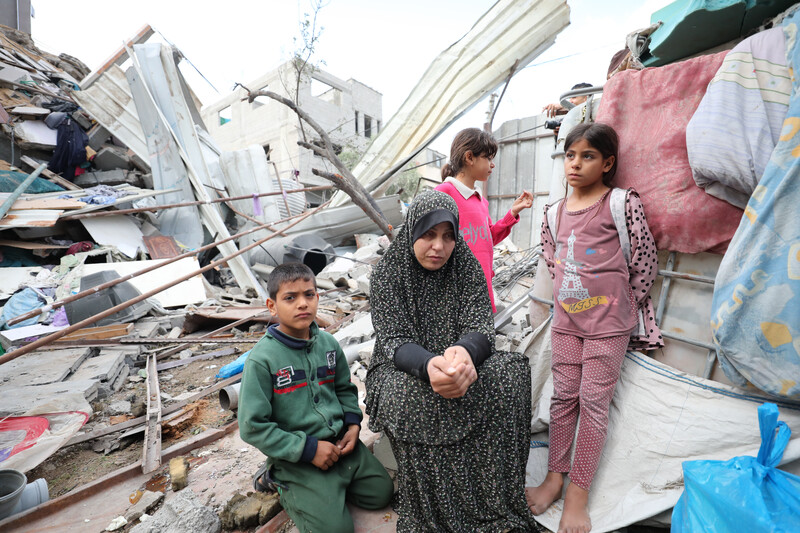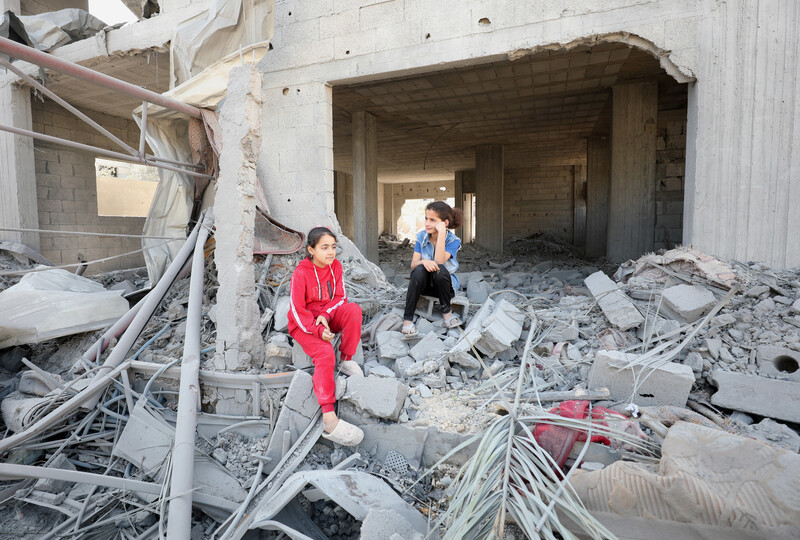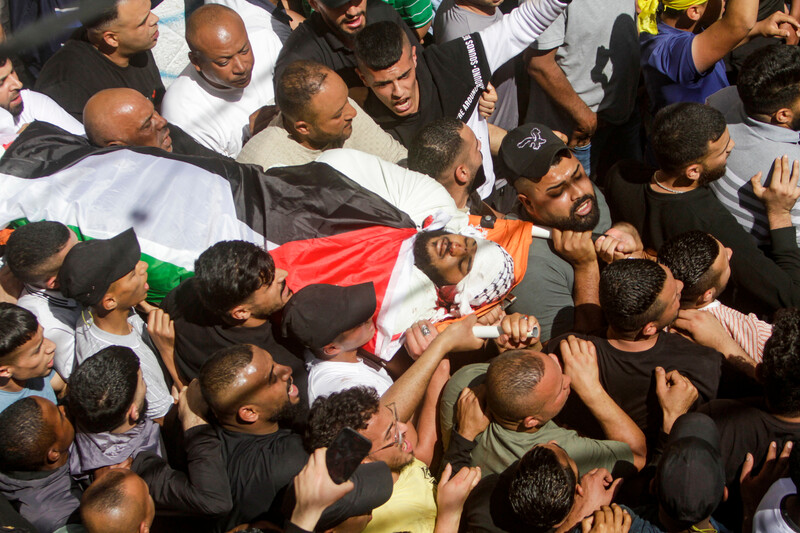Rights and Accountability 13 May 2023

The aftermath of Israeli airstrikes in Gaza City on 13 May.
APA imagesIsrael and Islamic Jihad in Gaza agreed to a ceasefire late Saturday evening, bringing to a tentative end five days of intense cross-boundary fire that claimed the lives of 33 Palestinians in the coastal enclave and two people in Israel.
Palestinians across Gaza celebrated in the streets upon the declaration of the Egyptian-mediated ceasefire:
Israel killed six leaders belonging to the Islamic Jihad resistance group in Gaza since launching a surprise attack at dawn on Tuesday.The resistance faction responded by firing hundreds of rockets toward central and southern Israel, disrupting business as usual in the country with air raid sirens heard in Tel Aviv and the Jerusalem area, as well as in communities near Gaza.
The text of the agreement, seen by the Reuters news agency, reportedly stipulates “an end to targeting civilians, house demolition, an end to targeting individuals immediately when the ceasefire goes into effect.”
Israel targets homes
During its latest assault on Gaza, Israel once again targeted civilian infrastructure, intensifying its strikes towards the end of the offensive.
Al Mezan, a human rights group based in Gaza, said that Israel destroyed nearly 60 residential units, displacing almost 375 people, around a third of them children.
Of the 33 Palestinians killed in Gaza since early Tuesday, at least 13 were civilians and six were members of armed groups, according to the UN human rights office, which added that the status of the remainder was “yet to be confirmed.”
Among the 13 civilians killed “were four girls, three boys, four women and two men,” according to the UN.
Some of the fatalities in Gaza are likely the result of rockets fired from the territory that fell short of Israel.
The Gaza health ministry said that some 150 Palestinians have been injured since Tuesday.
Palestinian rocket fire from Gaza killed an 80-year-old Israeli woman and a Palestinian laborer from Gaza who was working in the southern Naqab region.
Islamic Jihad had initially conditioned a ceasefire on Israel abandoning its policy of assassinating Palestinian resistance leaders and returning the body of Khader Adnan, the hunger striker who died in an Israeli prison earlier this month.
In a statement published shortly after the ceasefire took effect, the joint Palestinian resistance operations room warned Israel against further assassinations.
“We have not sheathed our sword, and our hands are ready on the trigger. If you return, we will return.”
The resistance in Gaza added that Israel wanted to end the fighting “as quickly as possible and on its own terms, believing this would allow it to make an achievement and emerge victorious.”
But Israel “was surprised by the wisdom and steadfastness of the resistance.”
War crimes
Israel targeted several Palestinian residential buildings in Gaza late Friday and early Saturday, seemingly to exert pressure on Islamic Jihad.
In many of those cases, Israel appears to have issued warnings to residents to avoid further casualties. Al Mezan said that this “does not exempt it from complying with international norms regulating the conduct of hostilities.”
The rights group added that “the direct targeting of civilian objects such as residential houses is strictly prohibited under international humanitarian law,” and that targeting civilian objects “amounts to a war crime” under the Rome Statute of the International Criminal Court.
The International Criminal Court opened an investigation into war crimes in the West Bank and Gaza Strip in 2021 but that probe appears to have been shelved by Karim Khan, the current chief prosecutor.
On Saturday, the Palestinian Center for Human Rights, based in Gaza, called on Khan to publicly condemn “Israel’s crimes,” excoriating the chief prosecutor for failing to issue a preventive statement at the outset of the latest escalation in light of Israel’s long history of targeting civilians and civilian infrastructure.
Israel reduced Palestinian homes to rubble in mere seconds, Al Mezan said, destroying “the life savings of entire families and their memories … causing social and psychological trauma.”
Israel’s closure of Gaza’s northern checkpoints early Tuesday worsened the already dire humanitarian situation in the territory, which has been under severe blockade since 2007.
Hundreds of Palestinians needing medical treatment – most of them cancer patients, and 27 of them needing life-saving care – were prevented from accessing hospitals in the occupied West Bank and Israel.
Meanwhile, Israel banned the entry of fuel for Gaza’s power plant, which only has enough supply to keep functioning until Monday, with one of its turbines already shut down in recent days, according to the UN.
The lack of fuel forced the closure of water treatment plants and around 120,000 cubic meters of untreated wastewater were being discharged into the Mediterranean every day, Al Mezan said, warning of an “environmental and health catastrophe.”
In addition to closures, access to health care in Gaza was disrupted by Israeli bombing.
Nearby medical facilities where patients were being treated were damaged in Israeli strikes on Friday that destroyed the homes of two Palestinian families in central Deir al-Balah.

The aftermath of Israeli airstrikes in Deir al-Balah, central Gaza Strip, on 13 May.
APA imagesThe explosions damaged the ICU of al-Aqsa hospital and caused panic among patients and their companions, most of whom were women and children, according to Al Mezan. A child patient and two hospital employees sustained minor injuries as a result of the Israeli strikes.
The hospital, the only one in central Gaza and which serves around 350,000 of the territory’s more than two million residents, was forced to shut down.
Shrapnel was also found at four schools administered by UNRWA, the UN agency for Palestine refugees.
Israel completely prohibited fishing off of Gaza’s coast throughout the fighting period, “affecting more than 4,400 fishermen and their families, who rely on fishing as their main source of income,” the UN added.
Civilians killed in West Bank
As Israel pounded Gaza, it killed three Palestinian men in the occupied West Bank on Saturday.
Israeli undercover forces invaded Balata refugee camp in the northern West Bank city of Nablus on Saturday morning and besieged the home of a wanted Palestinian, firing several rocket-propelled grenades at the two-story building, according to the Palestinian Center for Human Rights.
The rights group said that during the daytime raid, Saed Jihad Misheh, a 32-year-old merchant, was attempting to reach his workplace when he was shot in the head by an Israeli sniper, killing him.
While Wasim Adnan al-Araj, 19, was attempting to evacuate Misheh, he too was shot in the head by an Israeli sniper and killed, his body falling on top of that of the other slain man.

Palestinians take part in the funeral of Saed Jihad Misheh, 32, and Wasim Adnan al-Araj, 19, both shot by Israeli occupation forces in the Balata refugee camp in the northern West Bank city of Nablus on 13 May.
APA imagesGraphic footage of the aftermath shows two men lying on the ground with blood covering their faces as Palestinians attempt to come to their aid.
A witness told media that Israel’s fire “was directed at the head, not the ground. Their intent was to kill”:
Even as bystanders attempted to assist and transfer the men’s bodies, the Israeli fire didn’t stop, the witness added.The Palestinian Center for Human Rights said that both of the slain men were civilians.
The health ministry in Ramallah reported an additional three Palestinian injuries during the raid.
Also on Saturday, a Palestinian man was shot and killed by Israel’s paramilitary Border Police at a checkpoint in the northern West Bank.
The Palestinian health ministry in Ramallah identified the slain man as 33-year-old Ahmad Muhammad Atatreh.
Israel’s Border Police claimed that Atatreh ran towards Checkpoint 300 near the settlement of Shaked while brandishing a knife, however no Israelis were hurt in the incident, as is frequently the case in supposed attacks resulting in a Palestinian fatality.
The official Palestinian news agency WAFA said that Atatreh was shot while riding his bicycle near the checkpoint and that soldiers left him to bleed to death on the ground, preventing Palestinian paramedics and bystanders from coming to his aid.
Atatreh’s family was able to bury him on Saturday, despite Israel’s policy of confiscating the bodies of Palestinians killed in the course of what it claims were attacks on Israelis.
Maureen Clare Murphy contributed reporting.




